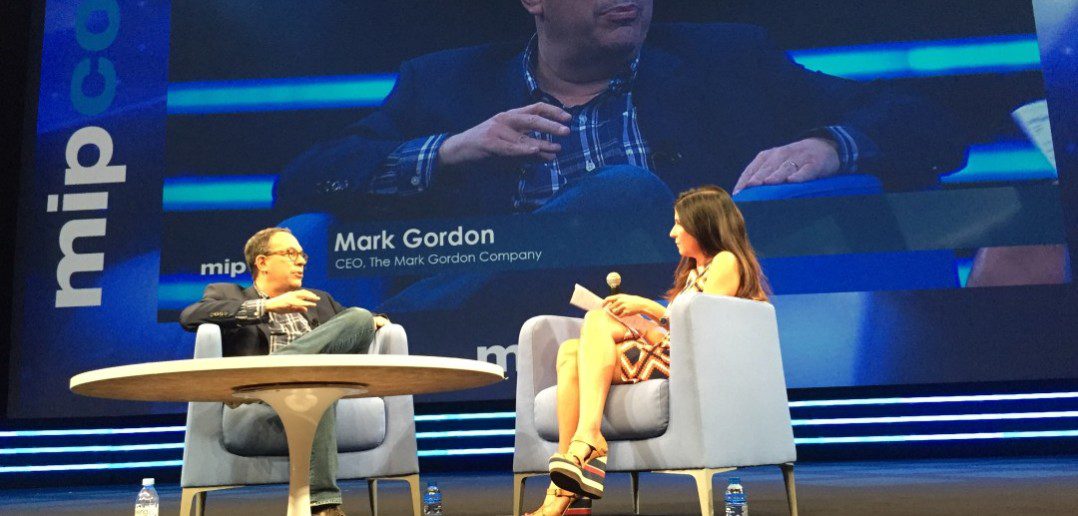You probably know the work of prolific producer Mark Gordon, responsible for projects like Grey’s Anatomy—for which he won a Golden Globe—as well as Ray Donovan and, more recently, Quantico. In 2015, he received the Producers Guild of America’s Norman Lear Award for achievement in television.
Now CEO of The Mark Gordon Company, this morning he was interviewed by Nancy Tartaglione, international editor at DeadlineHollywood.com. Here’s a roundup of that conversation.
Asked about his past at ABC, he admits it’s where he cut his production teeth.
« They are terrific distributors, » Gordon said. « And even though, as a studio producer at ABC, I was aware and engaged in the international distribution side of the business, I’m much more involved now. My focus has always been purely as a storyteller, creating things and relying on the people at ABC to really take the best opportunity to exploit the product. I have an opportunity now to learn from the folks at eOne. »
In addition to what he’s learning about the distribution side of the business, procedurals—a passion of Gordon’s—were also a recurring topic. Asked how domestic tastes are changing, he replied, « International buyers are frustrated by the lack of procedurals. From an economic point of view, domestic US studios do well financially with them, but networks are less interested. That’s because they’re not focused on the financial bottom line; their sister company is, » he said.
This week he hopes to talk with buyers about bringing those kinds of shows to new marketplaces.
« There’s more opportunity to create these shows, » said Gordon. « We’ll find a way, on a broadcast network or otherwise, to get these shows in the US. »
With a little nudging from Tartaglione, he also shared news about Darkness Falls, his first international co-production with ProSieben in Germany.
« When I first started working in TV 11 years ago, I was told if a show doesn’t work this year, put it in the trash, » Gordon reflected. « In the film industry, we don’t put anything in the trash; I have movies that I’ve been working on for 20 years, and now even television. »
Darkness Falls is one such show; it began its life as a pilot for CBS, and is about two FBI agents who go to small towns to deal with horrific crimes. It is set in the US. « I hope this will be the beginning of many co-productions for us, whether in the area of procedurals or serialised programming, » Gordon expressed.
On his own enterprise, Gordon said, « We’re focused on finding the right kinds of procedurals for international territories. » He elaborated, « When you’re a show producer, there’s little you concern yourself with financially other than the budget of your show. Often you can take the money from your wins and not pay for your losses. In the deal with eOne, and as it should be, the company will succeed or fail based on our wins and losses. I’m focused on being bold and careful at the same time. »
The movie industry is tough now, he added, so most producers are focusing specifically on finding financing for their projects, which is driving them into the international marketplace. « Many producers, for the longest time, didn’t have a passport, » he revealed, « they were so focused on receiving from the studio. That world doesn’t exist anymore, everyone has to be scrappier. »
He also addressed a fear we’ve oft heard repeated this week: « People have been saying there’s too much television. I don’t think there’s too much good television. »
Gordon elaborated, « You try to make great stuff. You try to make things that you fall in love with. And you hope there’s an audience for that. Don’t look at the audience and say ‘tell me what you want’, because I don’t think they know what they want; they want good. It’s all about great characters and great stories; I don’t think there’s enough of that on TV. »
He added that as a storyteller, he likes to think of himself as a plumber. To explain this metaphor, he uses an anecdote about the creator of Barney’s, the department store: Long before it was created, three children were asked what they wanted to do with their lives. One picked acting, another picked something else. Little Barney reflected and said, « I don’t know, but all those people will need clothes. »
« Someone’s gonna have to fix the pipes, » said Gordon. « Someone’s going to need a show we make, whether it’s NBC, ABC, Hulu, Apple TV, or something on the internet that doesn’t exist yet; a good story’s a good story. I’m lucky that’s the job I have because… they’re all gonna need clothes. »
Vision isn’t something filmmakers learn in film school, Gordon said. « It’s who you are as a human being. The stories that interest me are things that move me. And I’m fortunate to have been able to make so many things, and I can see that there’s emotionality and humanism in the stories I tell. Now it’s almost by osmosis. »
Tartaglione then asked whether he’s open to developing young new talent.
« I’m out of the demo, » Gordon admitted. « I’m over 49 years old, so sometimes I question myself about the subject matter. The things that interest me aren’t necessarily the things that interest the broad audience. But we have a lot of company executives much younger than I am, and I don’t need to love everything exactly the same, I just need to see the possibilities. We need to empower our young execs to bring new things into the company and fight for those things. »
As an example of how a youthful new vision changed him, he talked about his experience working with Shonda Rhimes—best known for TV hit Scandal—for the first time during the pilot for Grey’sAnatomy. At the time, she hadn’t done any television; « by the time we finished, I was asking her, ‘how would you do this?’, » Gordon said.
« One thing I learned from her was, don’t put colour or race or ethnicity in the script. We don’t do that in our scripts anymore. With Quantico, we weren’t looking for an Indian actress to play the lead. (Priyanka Chopra) just happened to be the best person for the job. Over the years, both from Shonda and from ABC who’s really encouraged that diversity, I’ve learned an enormous amount. It’s really paying off for ABC in a big way. »
https://www.youtube.com/watch?v=iRnFFinkCFA
Quantico is a study on what happens to Americans when they’re off American soil. « The show takes place all over the world, » an effect accomplished mainly with technology, green screen and stock footage; they couldn’t travel everywhere, said Gordon.
« And it’s not just about Americans who’ve gotten into trouble; it’s about Americans who also perpetrated crimes. In the US we read about Americans in trouble all over the world. I believe in the US this will have the same appeal that Criminal Minds does. »
Finally, Tartaglione why he believes these kinds of shows strike such a profound chord among audiences.
« People like to be scared, » said Gordon. « People like true crime stories. You don’t have to work as hard watching a procedural as you do on a serialised show. You don’t have to worry that you missed last week. »
He admitted, « I love making serialised shows. But there’s something that people feel (watching a procedural): Coming home, kicking off their shoes, and watching a great yarn for 42 minutes, knowing they can watch it every day of the year. It’s a simple, easy way, and there’s a play-along factor: Who did it? »
He pointed to Agatha Christie’s acclaimed mystery novels. « I just think it’s fun. »




